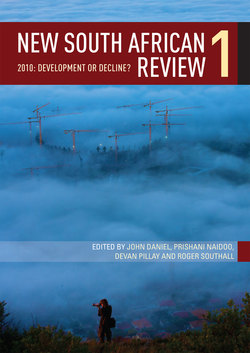Читать книгу New South African Review 1 - Anthony Butler - Страница 5
На сайте Литреса книга снята с продажи.
INTRODUCTION South Africa 2010: From short-term success to long-term decline?
ОглавлениеRoger Southall
For a decade and a half following the arrival of democracy, South Africa enjoyed its longest period of uninterrupted economic growth since the mid-1960s, ‘the golden age of apartheid’. Even if it is going far too far to suggest that the fifteen odd years after 1994 amounted to a ‘second golden age’ (Abedian 2009), crude economic indicators demonstrate positive annual growth throughout the period, an increase in per capita incomes (at year 2000 prices) from R20 214 in 1994 to R25 897 in 2008, and a decline in the proportion of people living in absolute poverty1 from 4.2 per cent in 1996 to 1.4 per cent in 2008 (SAIRR 2008–09: 92 and 302).
Further, even though the fruits of growth were highly unevenly shared and public service provision in key areas seriously attenuated, the extent of poverty was leavened by a substantial increase in transfer payments made by the state to the old, disabled, unemployed, for child support, and so on. Although these gains left much to be desired, it is nonetheless wise to locate them against the background of South Africa’s overall economic decline from around 1980 until 1994 and a period of near calamitous collapse during the uncertain years of the political transition. Meanwhile, this extended period of growth was accompanied by South Africa’s movement from racial authoritarianism to a democracy which, whilst incomplete, has provided a framework for political stability. Compared to the grim picture which the country projected in 1990, South Africa in 2010 is ‘another country’. Only a democratic South Africa, and one with a relatively advanced and stable economy, would have won the dubious honour of the right to host soccer’s World Cup in 2010 (Cornellison below).
Numerous critics have decried these achievements as seriously flawed: economically as failing to provide for socially just and sustainable development; politically by providing for a hollowed out democracy in which the constitution is under constant threat from the ruling African National Congress (ANC); and socially for a marked failure to ground aspirations towards collective welfare in an efficiently functioning state. Indeed, in this volume, we present a series of chapters which query the logic and performance of the present trajectory, outlining variously how its pursuit has led to deindustrialisation (Mohamed), persistent and unremittingly high levels of unemployment (Makgetla), and how it is running up against underlying resource constraints (Pillay, Swilling, Muller). Certainly, it is in the nature of the social sciences to provide critiques of the existing world against the imagination of utopias (even if, as Vale argues below, current state policies discourage such unbounded thinking). However, the role of the social sciences is also to compare existing reality against what might have been, whether for better or for worse. From this perspective, post-apartheid South Africa can lay claim to having been something of a success during the first two decades of democracy. The present outcome was by no means an historical inevitability, and accordingly critics of an imperfect present need to recognise that matters might have turned out a lot worse. Even so, it would seem that the foundations of this success over the short-term are today under threat; that this may be heralding a long-term decline; and that there is serious reason for South Africans to be worried about the direction in which their country is headed. This volume is devoted to exploring key dimensions of this possibility; and this introduction to sketching out its dynamics.
